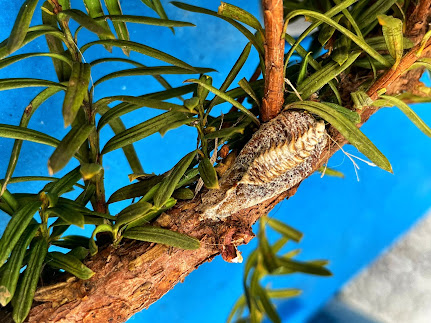Spoiler Alert: You won't find a recipe at the end of this post. It is instead a
love story, my personal ode to the versatile, delicious, globally beloved curry.
❤
Growing up in 80s, in the upper Midwest Great Lakes Region, I never experienced a curry dish.
I don't recall my mother ever making curries to stretch veggies and meat. In
fact, I don't even remember if she kept curry powder in her huge cache of
spices. I also never had curry at the homes of relatives and friends or at
restaurants. I am not sure I would have understood what curry was if I had been
asked to describe it as a child.

The first time I tried curry was with my friend B at this new Thai restaurant
that had sprung up in our city. This would have been around 1990 and I was in my
late teenage years. I had also been a vegetarian for 4 or so years. I had no
idea what it was, but I ordered the yellow curry and I can still remember how
much I loved the pineapples in it. It's wild to think how this was such a new
taste for me and, to date, Thai curries are still some of my top favorite
curries. Around the same time, an Indian restaurant opened up and I discovered
even more curries: Madras, dals, tikka masala, Rogan Josh. My little Midwest
world literally expanded each time I found a new curry to try.
Later, I discovered ones from Japan, Carribean, Europe, Korea, Vietnam, Africa, so many
places contributing a unique spin on the broad taste of curries and encouraging
my lifelong love affair with its spicy, saucy goodness. What does surprise me a
bit is how long it took for me to find curry. I mean punk rockers and the
PETA-card carrying youth of my youth all depended on curries to feed them
cheaply and healthily. I've read so many biographies where after a show, the
band was fed a cheap, wholesome curry. For more on the punk rock connection to curry, read the
cookbook/memoir Please Feed Me by Naill McGuirk. He talks about the curries that
sustained them when they had no money to pay the punk bands circulating through
Scotland. I also have a very hazy memory of hearing about curry from the Young
Ones. I'm sure as a teen I also saw recipes in the PETA newsletters B gave me
(from his mother who was a very early supporter of the organization) and the
'zines that were circulating. Where was my curiosity? Did I ever contemplate
making curry? Did I eat one and not know it was curry?
 |
Circa 1993 eating something not curry
|
I do remember sometime around 1993, B, another friend and I made a veg curry
using a steamer he had thrifted. We didn't call it a curry, but I am pretty sure
that is what it was. We basically made it up as we went along and it was yummy;
I remember it vividly to this day. It turns out, even though we did not come
from a traditional curry culture or even called our concoction "curry", we nailed
the basic concept of what constitutes a curry by smothering steamed veggies
under a spicy sauce. It took me probably a decade later before I would come to
depend on curries for regular meal planning and my own curries, I consider to be
very different from the ones I order at restaurants specializing in a particular
cultural curry. But that is one of the very lovely aspects of curry.


According to Wikipedia, curry is basically a gravy or sauce seasoned with
particular spices. Here is a mind-blowing fact about curry's origins: It took
the discovery of the New World and her gift of solanaceous plants like peppers,
potatoes, and tomatoes for the old world to invent curry. And Portugal is the
first nation to claim curry in a published cookbook. The word 'curry' is said to
be derived from Kari which a Southeast Asian word for "burnt". As we all know,
it was SE Asia and India that really took the concept and shook the rest of the
world with their very fine curries and, Britian for one, was smitten as curry became the UK's national dish. It didn't take long for to this dish to
become a worldwide sensation. Also mind blowing to me, curry eventually came to the Americas having been made from her own native vegetables.
Let's just read the bit from
Wikipedia because they
describe curry's world travels so well:
A first step in the creation of curry was the arrival in India of spicy hot
chili peppers, along with other ingredients such as tomatoes and potatoes,
part of the Columbian exchange of plants between the Old World and the New
World. During the British Raj, Anglo-Indian cuisine developed, leading to
Hannah Glasse's 18th century recipe for "currey the India way" in England.
Curry was then spread in the 19th century by indentured Indian sugar workers
to the Caribbean, and by British traders to Japan. Further exchanges around
the world made curry a fully international dish.
As part of the pantry challenge, I am making curry and it's the second one I
have made since January 01. I now make them so often, including sauces and curry
starters from my garden's tomatoes and peppers, you can bet on one at least
every month (if not more often). Curry is a perfect way to stretch veggies or
use up small amounts on hand. The one for today is a red Thai curry and I am
using up some of the pumpkin I grew in my garden, plus various bits from the
refrigerator and a store-bought sauce lingering in the pantry. I had planned to
use a jar of the green beans I grew as well, but once I had all the veg cut up,
I felt it was enough to make a satisfying curry. I will add tofu as the protein.
If I ate meat, curries are also a perfect way to stretch meat for a family.
 |
| Butter "chicken" sauce I canned from garden veg |

I cannot express my love loud enough for curry. As I said, I don't have a recipe
to share because, to me, curry is a very personal affair. The internet abounds
with base curries to try. To me, it goes like this: You make a curry-spiced
gravy and add in whatever your preference. If you like veg, almost any will
work. If you eat meat, there are chicken, beef, lamb, and even fish curries.
Tofu, chickpeas, seiten and other plant-based "meats" work just as well in
curry. I even love pineapples and other fruits in my curries. The amount and types of
spices round out this intimate relationship. While I love mine very flavorful
with garlic, ginger, curry, cumin, and other seasonings, my hot pepper tolerance is not what it
was back in my 20s. Also, I highly recommend visiting a SE Asian/Indian
market. You will be blown away by the assortment of different curry spices
available (and don't even get me started on the various chutneys to go with the curry!)

I encourage you to learn to make a curry
you love, especially if you are looking for a global, frugal, veg-heavy, pantry challenging meal. Bonus: Curry tastes better and better in the days following creation, making it a great one for leftovers.








































































